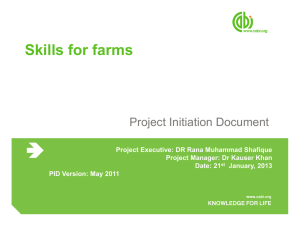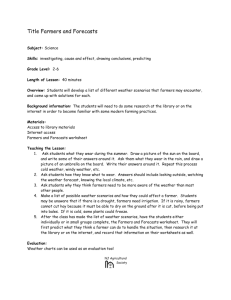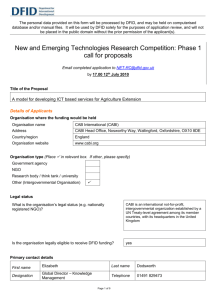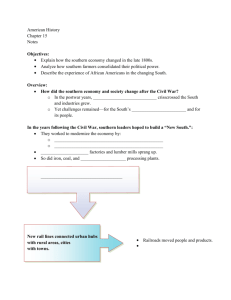AIRCA_DGs_meeting_2015_CABI_presentation
advertisement
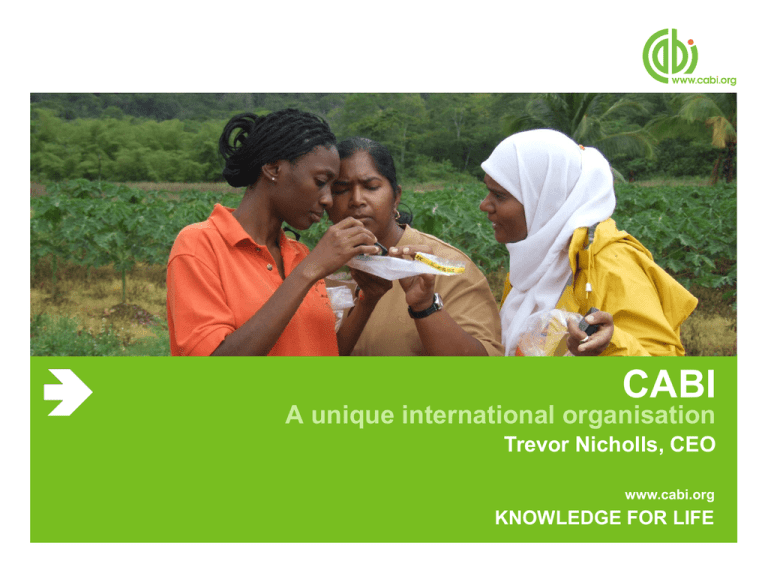
CABI A unique international organisation Trevor Nicholls, CEO www.cabi.org KNOWLEDGE FOR LIFE What is CABI? CABI is a not-for-profit science-based development and knowledge organization KNOWLEDGE FOR LIFE Our mission CABI improves people’s lives worldwide by providing information and applying scientific expertise to solve problems in agriculture and the environment KNOWLEDGE FOR LIFE We work on behalf of 48 member countries Global reach We have 400+ staff across 20 locations worldwide USA 3 UK 195 Netherlands 3 Switzerland 26 Hungary 1 Serbia 1 Bulgaria 1 Trinidad & Tobago 4 China 6 Costa Rica 1 Malaysia 10 Brazil 2 Australia 1 Ghana 3 India 11 Cameroon 1 Uganda 1 Kenya 27 Ethiopia 1 Pakistan 51 CABI’s business units ● Publishing ● Research databases, books, Compendia and Internet Resources ● Agriculture, veterinary science human health, leisure & tourism ● Knowledge Management projects ● International Development ● Commodities ● Invasive Species ● Knowledge for Development ● Bioservices is a “one CABI” initiative drawing skills and resources from both core businesses CABI Revenues 2014 ($million) Unrestricted, 1.9 Plantwise, 11.5 Publishing, 18.7 Int Dev, 14.4 100% = $46.5 million Strategic Goals Greater food and nutrition security Increased farmer incomes More sustainable farming practices Protection of environment and biodiversity Competencies, Content and Channels Print Electronic Mobile Video FFS Clinics Personal Communicating Science to Build Knowledge & Capability Animal Health Human Health (Nutrition) crops Plant Health Pests & Disease Seed Health Soil Health invasives Environmental Health Communicating with farmers – greater reach, frequency and impact Individual farm visits Impact Farmer field schools Mass media Reach Communicating with farmers ….. complementary channels for impact Individual farm visits Impact Farmer field schools Plant clinics Videos Mobile Internet & Social Media TV, Radio Reach CABI in 2020 – healthy, sustainable agriculture Trade and market access Weeds & Invasives & plant health Soils Seeds Nutrition Mobile/ICT Climate smart Integrated and sustainable Gender sensitive Digitally powered Mapping to needs and objectives Theme/Initiative Publishing/ Knowledge Management Mobile Bioservices Invasive species Knowledge for Development Plantwise Commodities Trade and Markets Builds capacity in: Availability, communication and use of knowledge Protecting biodiversity and environment Climate smart agriculture Better systems for plant health Improving trade and market access Supports strategic goals: More sustainable farming practices Protection of environment and biodiversity Greater food and nutrition security Increased farmer incomes Integrated Crop Management Improving cotton production Using integrated crop management approach including gender-responsive options Targets: ● Cut pesticide use by 50% ● Increase incomes by >30% ● Establish >200 farmer field schools Mozambique and Kenya 2010 – 2013 Funded by CFC, European Union & participating Country governments To date: ● 113 field school trainers trained ● 104 field schools reaching >2000 farmers Development Know-how Africa Soil Health Consortium ● ● ● Sub-Saharan Africa 2010 – 2014 Funded by the Bill & Melinda Gates Foundation Acts as the interface between developers of integrated soil fertility management knowledge (e.g. projects) and those who use the knowledge - extension workers, agrodealers and farmers Works with partners to design information materials that are customised for the target audiences Materials include policy briefs, booklets, radio and TV programmes Trade & market access Perking up coffee in Africa Farmers in Ethiopia, Rwanda and Cameroun get a better return for their coffee crop after learning new processing techniques that improve the quality of their coffee: Funded by: Farmer field schools teach new processing techniques to deliver higher quality Marketing helps farmers stimulate demand Funded by: • CFC • World Bank • Rabobank for coffees produced by the new approach, with premiums of over 30% above the usual prices being realised. Microfinance initiatives help more farmers buy equipment to adopt the new techniques India – Africa partnerships Mobile Agro-Advisory services Africa and India ● ● ● ● India – successful pilot project with IKSL (IFFCO/Airtel), won BITC award for excellence in 2011 India: development of ‘Direct 2 Farm’– database of farmer centred actionable information, testing ‘offshoring’ of several activities Africa: leveraging on work in India – working with GSMA projects to develop mobile agro advisory services with Airtel in Kenya; with ESOKO in Ghana. Pakistan: successful delivery of ‘New and Emerging Technologies’ grant for mobile agro-advisory services, leading to new DFID grant award 2011 – 2013 Biological control Tackling invasive species ● ● ● ● CABI has been working in Europe for over 100 years CABI centres in UK and CH Unique quarantine facilities Working with Governments / national research organizations / educational establishments / non-governmental and community based organizations / the private sector / EC / international agricultural research centres CABI’s food security strategy – lose less, feed more LOSE LESS, FEED MORE www.plantwise.org Think global, act local Content from CABI and partners Expertise from CABI and partners screen shot Knowledge Bank Plant doctors Data for prevention, identification and management Public good: trade, knowledge, food security Plant Clinics Practical assistance for farmers Global reporting network PW Implementation 2013 Caribbean & Central America Nicaragua Suriname Honduras Barbados Grenada Trinidad & Tobago Latin America Bolivia Peru Brazil Africa DR Congo Kenya Rwanda Sierra Leone Uganda Tanzania Ghana Zambia C&W Asia Pakistan Afghanistan South Asia Bangladesh India Nepal Sri Lanka East Asia China SE Asia Cambodia Vietnam How the clinics work Set up at local meeting places Free at the point of use Farmers come with problems and samples Receive a diagnosis and a ‘prescription’ from the plant doctor Private Sector: ESCO North Kivu, DRC; exports cacao, coffee, vanilla, papain and cinchona 6000+ registered farmers Clinics support farmers and help to improve production Clinics based at depots where farmers deliver produce Identify problems and effective responses Clinics have broad reach…. Bolivia (Feb 00 – April 09) Average of 11.5 queries per clinic session 9195 6815 801 10 Queries Users Sessions Clinics Impact Bangladesh clinics 350 farmers interviewed Average Farmers spent less money (mostly by using fewer agrochemicals) $16.71 saving Yields increased Over 9% increase Farmers’ gross income increased $325 increase per harvest Livelihoods improved Farmers spent the additional money on: 95% of the farmers earned extra income by adopting the plant clinic recommendations Children's education (25%) Home improvement (21%) Investment in the farm (43%) Buying a cow (13%) Planting (9%) Buying land (9%) Growing a crop (7%) Agriculture (5%) Other (11%) Clinic data at work Pest analysis: cassava Data set: 1500 queries >700 clinics in 31 countries Over 2000 plant doctors trained Estimated >600,000 farmers helped Open Access Knowledge Bank Open Access Knowledge Bank 100 crops, 2,500 pests/diseases 7,500 factsheets Creation of links to numerous online information resources Positive user feedback Over 250,000 page visits per year from 188 countries 18,000 plant clinic records Online management tools for collecting and quality controlling clinic data Knowledge Bank Country tailored homepages Comprehensive resource Fact sheets and practical help Diagnostic guidelines Treatment and mitigation advice Pest risk assessments Clinic data Quarantine information Legislation and safety information Mapping and analysis tools Supporting literature Value to many users Practical advice for farmers and extension services Open access to data and information for scientists Analytical tools and support for trade and policy Researchers Policy makers Extension workers Agrochemical suppliers Plant protection services Food producers and traders What differentiates CABI from others? ● ● ● ● ● CABI focus - Lose less, Feed more, CABI puts research into use CABI’s governance marries interests of developed and less developed parts of the world Developed Member Countries use CABI’s expertise (e.g. UK, Switzerland, Canada) and contribute to the CABI Development Fund CABI’s less developed Member Countries rely on CABI to source programmatic support from donors ke itumetse grazie terima kasih terima kasih xie-xie teşekkür ederim kiitos dank u efharistó merci dhanyawaad शुक्रिया ありがとう danke благодаря obrigado спасибо cảm ơn cô faleminderit 谢谢 salamat asante sana நன்றி mersi Assalamualikum zikomo urakoze thank you tak stuh-tee gracias Trevor Nicholls CEO E: t.nicholls@cabi.org www.cabi.org KNOWLEDGE FOR LIFE


